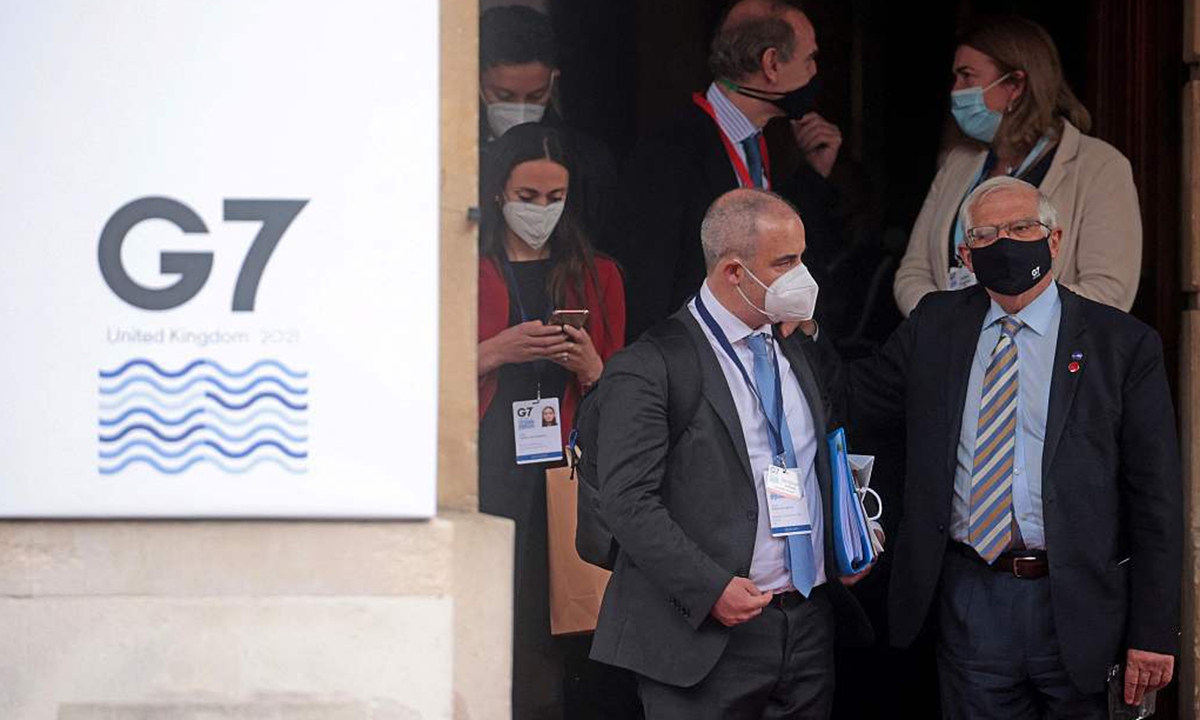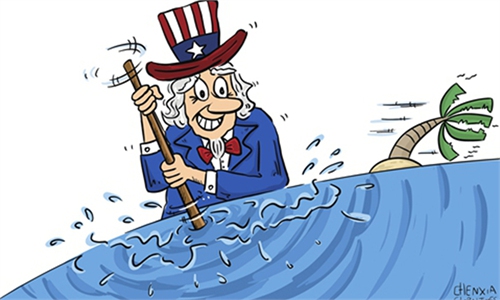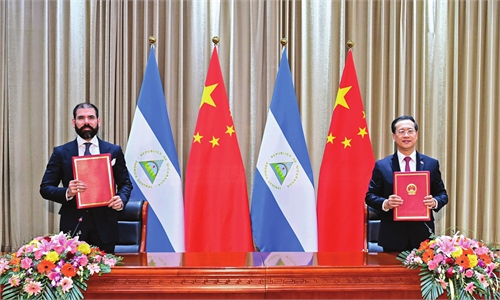West launches ideology warfare on China with 'economic coercion' claim
US woos allies to demonize Beijing in world public opinion

G7 Photo: VCG
With G7 countries hyping so-called China's coercive economic policies at the just-concluded summit in Liverpool, the Washington-led slander of Beijing with "economic coercion" is climbing to a peak in recent days. Observers said the move - in sharp contrast to the absence of accusations against the US, the world's largest launcher of coercive practices - shows the malicious aim of a small Western circle, made up of some "democratic" countries, to cast themselves as victims to justify the illegal sanction weapons that ultimately serve their anti-China agenda.
The playbook on China's alleged economic coercion sounds quite familiar, after the West has been flexing its political and economic clout to wage "a combo of punches" to smear China - ranging from targeting China on virus origins to alleged human rights abuses in China's Xinjiang region.
The organized attack has underscored a different ideological path of the US-led West to contain China, a tactic to taint China's global image as a way to deter regional cooperation and marginalize its economic influence, after the Western world has been unnerved by China's spectacular rise as the world's second-largest economy yet realized that such a trend is irreversible. Analysts described it as a desperate move, reckoning that the strategy will end up in vain, just like how the US failed its allied economic approach to block China's peaceful rise.
According to a South China Morning Post (SCMP) report, the Group of Seven (G7) expressed concerns on Sunday over what it called Beijing's "coercive economic policies," as Western countries' concerns grow over the so-called "punitive measures" China has allegedly taken against Lithuania over the latter's move to deepen its ties with the island of Taiwan.
The G7 is composed of the US, the UK, Canada, France, Germany, Italy and Japan, plus a representative of the European Union.
The SCMP report also cited British Foreign Secretary Liz Truss as saying at a press conference that G7 members hope to "build the investment reach [and] the economic trade reach of like-minded, freedom-loving democracies."
"The G7 Summit is part of the Western attempt to build up the momentum for hyping alleged Chinese economic coercion. Isn't this familiar? We have seen similar tactics before, like Western politicians' groundless claims surrounding the tracing of COVID-19 origins," Cui Hongjian, director of the Department of European Studies at the China Institute of International Studies, told the Global Times. "First, a concept targeting China is put forward, then relevant parties desperately seek evidence to validate the claim."
Ideological attack
The discussions at the G7 meeting over the so-called economic coercion of China are the latest in a series of attempts by Western countries to fabricate that vary charge against the Chinese government, experts said, as certain countries tried hard to suppress China with ideological accusations after they have failed to do this using trade sanctions.
Such efforts include the EU's recent move to unveil an "anti-coercion" instrument that could shut countries in question out of EU markets in cases of economic bullying, a tool which most overseas media interpret as primarily targeting China.
"The West now portraits themselves as a victim of alleged China's economic coercion, under which they are able to weaponize political and economic tools to crack down on China's rise. At first glance, the move seems like a defense. But it is well-prepared collective warfare," Cui said.
If any country has launched an economic coercion move, it should be discussed openly and fairly at multilateral platforms, such as the G20 and the United Nations, Cui said, "No single party has the right to legally define it, nor does the G7 have the right."
Experts also stressed that the economic coercion allegation is part of "a combo of punches" adopted by the West to curb China's rise using ideological attacks, ranging from the so-called genocide in Xinjiang to smearing the China-proposed Belt and Road Initiative as spreading government influence, after the small US-led circle has almost emptied its economic toolbox against China, including a two-year trade war.
"Washington has invented an ideological tactic, manifesting it in the economic and supply chain sphere. The new strategy aims to cast China as an irresponsible and unjust economy despite having risen as the world's second-largest, potentially deterring other economies from working with a cardinal partner," Cui said.
Li Haidong, a professor at the Institute of International Relations of the China Foreign Affairs University, said that the US is wooing "whatever country that the West can woo" and use the issues that can be "fabricated" to denigrate China in an unlimited geopolitical competition.
Li predicted that Western countries will take further steps to demonize China at the level of international public opinion, so as to try to kidnap international organizations that the US can kidnap or that are dominated by the West. "There seems to be a tendency of the US and Europe to converge in the use of such tools against China, as the two sides seem to have been embroiled in a competition over who is fiercer toward China."
US the No.1 coercer
Experts also stressed that when talking of economic coercion, the US is the world's No.1 coercer as there is a long list of economic punishment measures the US has taken, whether in history or at present, for competitors or for even friends, and in developing or developed countries.
A typical example is the US' action to interfere in three Pacific island nations' decision on an underwater internet cable bid last year, as it warned those nations about the so-called security threats posed by Chinese tech giant Huawei, one of the bidders. The project got stranded after the warning, Reuters reported.
On China, the US launched economic sanctions against domestic tech companies, ranging from the latest case of placing SenseTime on an investment blacklist, to an earlier crackdown on Huawei, TikTok and China's three major telecom giants, which were forced to delist from US stock markets.
The US was never lenient when launching economic punishment on its "allies," with measures such as imposing a $772.3 million fine on French company Alstom and raising the tariffs on EU aircraft in March 2020.
"The US wants to trample on globalization and let the rest of the world feed it. It wants to break the normal convergence of globalization and engage in trade protectionism, thus forming an entire international economic and trade pattern along the single dimension, which helps the US economy but drags down the globalization and other countries' economies." Li said.
Calling such action "typical coercion," Li said that the US is using its so-called comprehensive strength to kidnap other countries. "The US cannot accept the existence of any other country that has the potential to compete with it... It's robber and colonial logic," Li noted.

G7 Photo: VCG
With G7 countries hyping so-called China's coercive economic policies at the just-concluded summit in Liverpool, the Washington-led slander of Beijing with "economic coercion" is climbing to a peak in recent days. Observers said the move - in sharp contrast to the absence of accusations against the US, the world's largest launcher of coercive practices - shows the malicious aim of a small Western circle, made up of some "democratic" countries, to cast themselves as victims to justify the illegal sanction weapons that ultimately serve their anti-China agenda.
The playbook on China's alleged economic coercion sounds quite familiar, after the West has been flexing its political and economic clout to wage "a combo of punches" to smear China - ranging from targeting China on virus origins to alleged human rights abuses in China's Xinjiang region.
The organized attack has underscored a different ideological path of the US-led West to contain China, a tactic to taint China's global image as a way to deter regional cooperation and marginalize its economic influence, after the Western world has been unnerved by China's spectacular rise as the world's second-largest economy yet realized that such a trend is irreversible. Analysts described it as a desperate move, reckoning that the strategy will end up in vain, just like how the US failed its allied economic approach to block China's peaceful rise.
According to a South China Morning Post (SCMP) report, the Group of Seven (G7) expressed concerns on Sunday over what it called Beijing's "coercive economic policies," as Western countries' concerns grow over the so-called "punitive measures" China has allegedly taken against Lithuania over the latter's move to deepen its ties with the island of Taiwan.
The G7 is composed of the US, the UK, Canada, France, Germany, Italy and Japan, plus a representative of the European Union.
The SCMP report also cited British Foreign Secretary Liz Truss as saying at a press conference that G7 members hope to "build the investment reach [and] the economic trade reach of like-minded, freedom-loving democracies."
"The G7 Summit is part of the Western attempt to build up the momentum for hyping alleged Chinese economic coercion. Isn't this familiar? We have seen similar tactics before, like Western politicians' groundless claims surrounding the tracing of COVID-19 origins," Cui Hongjian, director of the Department of European Studies at the China Institute of International Studies, told the Global Times. "First, a concept targeting China is put forward, then relevant parties desperately seek evidence to validate the claim."
Ideological attack
The discussions at the G7 meeting over the so-called economic coercion of China are the latest in a series of attempts by Western countries to fabricate that vary charge against the Chinese government, experts said, as certain countries tried hard to suppress China with ideological accusations after they have failed to do this using trade sanctions.
Such efforts include the EU's recent move to unveil an "anti-coercion" instrument that could shut countries in question out of EU markets in cases of economic bullying, a tool which most overseas media interpret as primarily targeting China.
"The West now portraits themselves as a victim of alleged China's economic coercion, under which they are able to weaponize political and economic tools to crack down on China's rise. At first glance, the move seems like a defense. But it is well-prepared collective warfare," Cui said.
If any country has launched an economic coercion move, it should be discussed openly and fairly at multilateral platforms, such as the G20 and the United Nations, Cui said, "No single party has the right to legally define it, nor does the G7 have the right."
Experts also stressed that the economic coercion allegation is part of "a combo of punches" adopted by the West to curb China's rise using ideological attacks, ranging from the so-called genocide in Xinjiang to smearing the China-proposed Belt and Road Initiative as spreading government influence, after the small US-led circle has almost emptied its economic toolbox against China, including a two-year trade war.
"Washington has invented an ideological tactic, manifesting it in the economic and supply chain sphere. The new strategy aims to cast China as an irresponsible and unjust economy despite having risen as the world's second-largest, potentially deterring other economies from working with a cardinal partner," Cui said.
Li Haidong, a professor at the Institute of International Relations of the China Foreign Affairs University, said that the US is wooing "whatever country that the West can woo" and use the issues that can be "fabricated" to denigrate China in an unlimited geopolitical competition.
Li predicted that Western countries will take further steps to demonize China at the level of international public opinion, so as to try to kidnap international organizations that the US can kidnap or that are dominated by the West. "There seems to be a tendency of the US and Europe to converge in the use of such tools against China, as the two sides seem to have been embroiled in a competition over who is fiercer toward China."
US the No.1 coercer
Experts also stressed that when talking of economic coercion, the US is the world's No.1 coercer as there is a long list of economic punishment measures the US has taken, whether in history or at present, for competitors or for even friends, and in developing or developed countries.
A typical example is the US' action to interfere in three Pacific island nations' decision on an underwater internet cable bid last year, as it warned those nations about the so-called security threats posed by Chinese tech giant Huawei, one of the bidders. The project got stranded after the warning, Reuters reported.
On China, the US launched economic sanctions against domestic tech companies, ranging from the latest case of placing SenseTime on an investment blacklist, to an earlier crackdown on Huawei, TikTok and China's three major telecom giants, which were forced to delist from US stock markets.
The US was never lenient when launching economic punishment on its "allies," with measures such as imposing a $772.3 million fine on French company Alstom and raising the tariffs on EU aircraft in March 2020.
"The US wants to trample on globalization and let the rest of the world feed it. It wants to break the normal convergence of globalization and engage in trade protectionism, thus forming an entire international economic and trade pattern along the single dimension, which helps the US economy but drags down the globalization and other countries' economies." Li said.
Calling such action "typical coercion," Li said that the US is using its so-called comprehensive strength to kidnap other countries. "The US cannot accept the existence of any other country that has the potential to compete with it... It's robber and colonial logic," Li noted.



